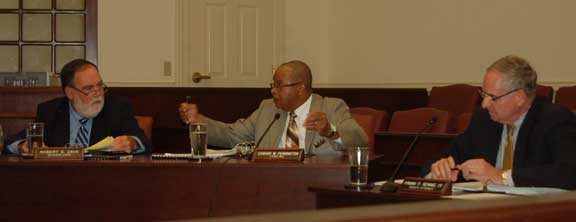Board to hold hearing on jail
Published 5:17 pm Thursday, October 20, 2016

- Photo by Martin L. Cahn Loves Mill District Supervisor Edward W. Pennington, center, makes a point during the Lunenburg County Board of Supervisors’ Oct. 13 meeting. Supervisors ultimately voted unanimously to hold a public hearing in November on a proposed resolution to approve a draft agreement to join the Piedmont Regional Jail Authority.
The Lunenburg County Board of Supervisors voted unanimously Thursday to hold a public hearing and consider a draft agreement during its November meeting to join the proposed Piedmont Regional Jail Authority (PRJA).
County Administrator Tracy Gee said there have only been a few small revisions to the draft agreement since county administrators from the PRJA’s potential members last reviewed it. One of those revisions speaks to how the proposed authority would vote to take actions.
“How do we decide? A simple majority vote, a super majority vote or a unanimous vote?” Gee explained. “The items we would have used a unanimous vote for, we have changed to super majority, meaning a majority of the entire board, whether they’re present or not.”
Gee said the future PRJA board would have to have two-thirds of the entire board vote in favor of an action — no matter how many actual members were in attendance — in order for it to pass.
“That’s three representatives for each locality,” she said, further explaining there are six localities for a total of 18 members.
Later in the meeting, Gee said the three locality representatives would include a member of law enforcement — the sheriff — and either two elected officials or an elected official and a finance representative.
Another change involved the rate at which member counties would be charged for being late on quarterly payments to operate the jail.
Gee asked whether the supervisors all felt comfortable to considering a resolution at November’s board meeting, and holding the associated public hearing, to adopt the draft PRJA agreement.
“Knowing that, yes, it may require that we go into a jail authority bonding issue in order to pay for the booking area that’s required by the Department of Justice,” Gee said. “If we do that, that liability falls with the authority first. Ultimately, yes, you will always be responsible for your portion of the debt, but you’re not responsible for all of it should another county defaults.”
Gee said the county “has to get this done” in order to protect its liability and reduce the amount Lunenburg must register on its debt, if it has to issue any.
County Attorney Frank F. Rennie IV said he is most concerned that, with the arrangement as it is now, without an authority, the county faces liability for lawsuits.
“We’ve seen several lawsuits come up over the last few months,” Rennie said, “because we’re not an authority yet. When we become an authority, then the authority will be the defendant in the lawsuits rather than the individual counties.”
Rennie said he thinks there are two or three lawsuits going on now where individual counties have been sued.
“The good news of that is that we’ve got insurance, and insurance companies then defend the counties when a lawsuit is filed. From the standpoint of the administration and the work they have to put in whenever we have to respond to one of these lawsuits — and also your county attorney’s time — it makes all the sense in the world to form an authority so that they’re a separate entity from the county,” Rennie said.
He said discussions on creating the PRJA have been ongoing for more than a year and a half. Rennie said the biggest concern for the county had been rules governing how member counties can withdraw from the authority.
“If we found the arrangement wasn’t good or we wanted to open our own jail — the way that we had wanted that wording to take place is what is in here (now),” he said, adding he is comfortable with the latest draft of the agreement.
Plymouth District Supervisor T. Wayne Hoover said another concern was the makeup of the board, especially making sure it included elected officials.
“We did not want constitutional officers, we did not want other people, obligating money that, ultimately, we’re going to have to pay,” Hoover said.
After supervisors’ unanimous vote, Gee noted a public hearing wasn’t technically required to consider the proposed resolution, but felt better about having one so the terms of the agreement would be public information.





